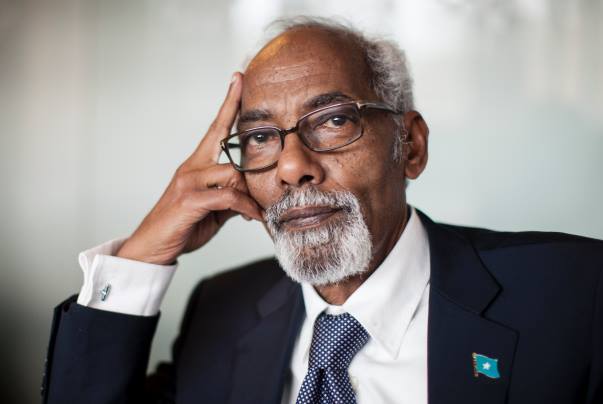
September 4, 2015
Political crisis are part of democratic system of governance but it can be avoided or properly managed by good quality leadership that adheres to the rule of law, good policy, and to a well-defined, transparent procedures, and practices in order to have a trustworthy government. The handling of impeachment motion against President Hassan Sheikh Mohamud is a major challenge to the leadership quality of parliament Speaker Mohamed Sheikh Osman Jawari who must ensure the practice of differentiating political arguments from constitutional and legal arguments. The frivolous claims of constitutionality and unconstitutionality of an argument by everyone in the media must be challenged and corrected through rulings, opinions, and decisions of legitimate institutions and processes.
The Speaker’s principal responsibility is to make parliament’s activities consistent with pre-agreed norms, procedures, and practices founded on legal, administrative, and common sense principles with the aim of improving public confidence in Parliament and whole government. Stalled process of impeachment motion fans social conflict, speculations, and erodes nation building and state building efforts and hopes.
Article 61 § 1 of the provisional constitution establishes the political, legal, and moral responsibility of members of parliament who in fulfilling their duties should be guided by the best interests of the nation as whole. This reflects the quote of Edmund Burke:
“Parliament is not a congress of ambassadors from different and hostile interests; which interests each must maintain, as an agent and advocate, against other agents and advocates; but parliament is a deliberative assembly of one nation, with one interest, that of the whole; where, not local purposes, not local prejudices ought to guide, but the general good, resulting from the general reason of the whole. You choose a member indeed; but when you have chosen him, he is not a member of Bristol, but he is a member of parliament.”
The impeachment motion submitted under articles 69 § 2 (b and f), 92, 138 § (2), 109 C § (f), and 139 of the Provisional Constitution on August 12, 2015 is still pending with the Speaker. In compliance with article 92 § 3, the Speaker has the solemn responsibility of submitting the impeachment motion to the Supreme Court for legal probe before parliamentary debate.
The 9 page impeachment motion against President Hassan Sh. Mohamud lists specific allegations of breach of the constitution and rule of law to be supported by evidences presentable to the Supreme Court. The allegations include the issuance of unconstitutional decree used for the killing of Somali Citizens, gross human rights violations like extra judicial execution, illegal detention, forced displacement of Internally Displaced People (IDPs) for private interests, usurpation of the executive authority by establishing a super structure Policy Unit in the Office of the President over the Council of Ministers, engagement in massive documentable corruption, writing of illegal letters to foreign financial institution for transfer of financial assets, the killing of members of parliament, interference in independent commissions and judiciary institutions, and lack of salary payment to security forces and government personnel for illegal reasons. These allegations are serious and must be proven at trial.
Unusual powerful opponent of the parliamentary impeachment motion is Ambassador Nicholas Kay, head of UN Mission for Somalia (UNSOM) who is engaged in open international and local campaign to quash the motion without remedy to the crimes cited in the motion. In few months ago, the International Community accepted the no confidence motion against former Prime Minister Abdiweli Sheikh Ahmed.
Purposely, the impeachment and no confidence motions are established to restore public trust in government leaders, respect of the rule of the law, and political honesty after scandals, incompetence, inefficiency, and abuse of powers tarnished the President and the Council of Ministers respectively. The misuse of motions must be prevented on legal grounds. The convention is that governments will continue to remain in place whatever the outcome of motions is.
The only question that merits clarification with respect to the impeachment motion is the absence of Constitutional Court mandated to provide legal opinion before parliamentary debate. But there are many examples on how to overcome such an institutional deficiency or encumbrance. As per article 109B, only five judges render Judicial Judgement. The Supreme Court Judges added with additional four judges could render judgement on the legality of the allegations cited in the Impeachment motion.
More importantly, the Provisional Constitution has established the obligation of impeaching the president if he or she breaches the constitution and the law. Thus, there must be either an ad hock body or use of existing one for the trial of the instituted impeachment duty. Ultimately, the disposition of the impeachment motion is very important for fairness in dealing with cases of breach of rule of law by the president or by the prime ministers.
The submission of an anti-impeachment motion by more than 100 members of the federal parliament is unnecessary, frivolous, and violates parliamentary rules and tarnishes the image of the federal parliament considered by many as a market place for chaos and vote buying. Opponents of the impeachment motion have the right to defeat it in parliament if the allegations against the President are concocted and baseless. The anti-impeachment motion strengthens the inevitable debate of the impeachment motion in parliament to determine the truth in transparent public process. The right path to exhaust the constitutional process for the disposition of the impeachment motion is outlined in article 92 of the provisional constitution.
The legal presentation and rebuttal of the specific allegations of the crimes attributed to the president in trial supports the practice of the rule of law, deters abuses of public officials, and strengthens institutional credibility and capacity. It is quite possible that the Supreme Court may decide against the going forward of the impeachment motion for clear legal reasons. Alternatively, it can allow the debate of the impeachment motion in the federal parliament and the dismissal of the President would take place if 2/3 of the members of parliament vote in favor of the motion.
But the prolonged keeping of the impeachment motion in suspense has created legal, political, and security tensions that brought back social conflict of clan antagonism and that fueled negative speculations about Speaker Jawari’s leadership.
The public statements of some Hawiye leaders in support of President Hassan on clan arguments and the rumored recourse of the President to seek clan support have poisoned the political discourse and intensified social disharmony. Other Hawiye leaders distanced themselves from the defense of president on clan argument. The proponents of the impeachment motion claim to be representatives of Somali 4.5 clans.
Use of clan divisive tactics to defeat the impeachment motion is contemptable. As caveat, I recognize that Somali communities and citizens have the right and responsibility to test political leaders’ actions and policies against the lenses of clan or religious tendencies and discrimination, personal and group interests, and foreign interests. But in the cases of impeachment and no-confidence motions, the use of clan alignment and corruption should be protested and shamed. President Hassan warned relatives of arrested citizens as suspects for crimes against the law to not pressure for their release before the security and judiciary system determine their culpability or innocence. Equal treatment under the law must be respected and supported.
The Speaker of Somali Parliament has the responsibility of handling the impeachment motion in accordance with the rule of law to restore public confidence in government leaders. The public would have the opportunity to see and understand the merits of the serious allegations labelled against President Hassan Sh. Mohamud. Transparent public trial and parliament debate would tame public division along clan lines. The best interest of the Somali people lies in the swift disposition of the Impeachment motion through the transparent process promised in the statement of Parliament leadership.
Mr. Mohamud Uluso
mohamuduluso@gmail.com
_____________________________________________________________________________________
Xafiiska Wararka Qaranimo Online | Mogadishu, Somalia
_____________________________________________________________________________________Advertisement
_____________________________________________________________________________________







